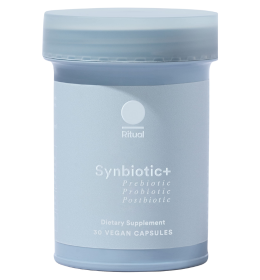
Fermentation sounds like some fancy culinary technique, but it’s pretty common. Think about bread, cheese, beer, and even pickles—all are fermentation products.
Fermentation is a chemical process where microorganisms, like bacteria or yeast, break down sugars and convert them into alcohol or acids. Fermentation extends the shelf life, creates unique flavors, and provides a variety of gut health benefits.
Our gut is home to trillions of microorganisms comprising our gut microbiome. These microorganisms are vital in digestion and our well-being. An imbalance in our gut microbiome can lead to gut conditions like irritable bowel syndrome and chronic illnesses like diabetes,[1] among others.
Now, research has shed light on how fermented foods can improve our gut health. Read on for the best-fermented foods for gut health.
8 Fermented Foods That Help With Your Gut Health
Here are the best-fermented foods to improve your digestive health:
- Natto.
- Tempeh.
- Kefir.
- Kombucha.
- Probiotic yogurt.
- Miso.
- Kimchi.
- Sauerkraut.
8 Healthiest Fermented Foods For Gut Health

An imbalanced or disrupted gut microbiome, called dysbiosis, has been linked to various health issues,[2] including irritable bowel syndrome,[3] autoimmune diseases,[4] and inflammation.[5] Factors contributing to dysbiosis include diet,[6] antibiotic use,[7] stress, and genetics.[1]
Conversely, a healthy gut microbiome is associated with better overall health. Improving your gut microbiome means cultivating a diverse and balanced population of microorganisms supporting digestion. The beneficial bacteria present in fermented foods[8] can improve gut microbiome diversity,[9] which is linked to better overall health.[10]
Here is the list of fermented foods for gut health:
FEATURED PARTNER OFFER

Ritual Synbiotic+
- 3-in-1 formula: prebiotics, probiotics, and probiotics
- Supports a balanced gut microbiome
- Supports bloating, gas, and diarrhea
- Supports the growth of beneficial gut bacteria
- Vegan and Third-party tested
Natto
Natto is a traditional Japanese food made from soybeans fermented with the Bacillus subtilis[11] bacteria. The mixture is left to ferment for 24-48 hours, and the bacteria produce enzymes that break down the soybean proteins into more digestible forms. This creates the characteristic sticky natto texture.
Research shows that consuming natto significantly modifies the gut microbiome,[9] and can improve gut symptoms,[9] including bloating, diarrhea, and constipation.
Aside from probiotic bacteria, natto is known for its strong nutritional profile.[12] It is a rich source of protein, fiber, and essential nutrients like vitamin K,[13] which is essential for bone health[14] and regulating blood clotting.[15]
Natto is traditionally enjoyed as a breakfast dish, often served over rice and garnished with various condiments such as soy sauce, mustard, or green onions.
Tempeh
Tempeh is another fermented soybean product made by fermentation with the fungus Rhizopus oryzae or Rhizopus oligosporus. Animal studies suggest that eating fiber-rich tempeh increases beneficial bacteria[16] levels in the gut.
Another advantage of tempeh is its improved digestibility.[17] The fermentation process breaks down complex carbohydrates and proteins found in soybeans, making them more easily digestible. This can be particularly beneficial if you are looking for foods that help with bloating and gas.
Fiber is prebiotic, meaning it feeds the bacteria already present in your gut, further supporting gut health.[8] Prebiotics are non-digestible carbohydrates that act as food for beneficial gut bacteria. Tempeh may promote the growth and activity of these bacteria by promoting gut microbiome diversity.
Tempeh is also an excellent source of plant-based protein[18] and a range of vitamins for gut health, including B vitamins and essential minerals[19] like iron, calcium, and magnesium.
Kefir
Kefir is a fermented milk product, like a drinkable yogurt. It’s made with kefir grains — small white balls containing bacteria and yeast. Its probiotics[20] may promote healthy digestion by breaking down food better.
It is especially helpful for people with lactose intolerance because the fermentation process reduces the lactose content.[21] Kefir may also provide immune system support[22] and reduce the risk of gastrointestinal infections.
Kefir comes in various forms, such as water-based, milk-based, and juice-based. This helps to accommodate dietary preferences and restrictions. Consume it as a beverage, blend it into smoothies, or use it in recipes as a yogurt or buttermilk substitute.
Kombucha
Kombucha is a type of fermented tea with proposed gut health[23] benefits, although the evidence is scant. This traditional Chinese tangy, fizzy drink is made by fermenting tea and sugar with a symbiotic culture of bacteria and yeast. The microorganisms consume the sugar, producing health-promoting organic acids, probiotics, and other compounds.
While research on the precise health benefits of kombucha continues, some studies[24] suggest that regular consumption may lead to improved gut microbiome balance. One notable component of kombucha is acetic acid, which adds a characteristic tangy flavor. Acetic acid creates a favorable environment for beneficial bacteria[25] growth while inhibiting the growth of harmful ones.
Probiotic Yogurt
Yogurt[26] is made by fermenting milk with bacterial cultures, primarily Lactobacillus and Streptococcus. Regularly eating live probiotic yogurt can promote a diverse and beneficial population of gut bacteria.[27] This can aid digestion, reduce symptoms of irritable bowel syndrome, and strengthen the immune system.
Yogurt is also easier to digest[28] for people who are lactose intolerant compared to regular milk because the bacteria used in fermentation help break down lactose. This can reduce symptoms like farting, gas, and diarrhea.
It’s easy to add yogurt to your diet. It is compatible with many meals and can also stand alone. Not all yogurts are live, so be sure to choose one with live and active cultures.
Miso
Miso is a fermented soybean paste. It is made by fermenting soybeans with salt and koji — a starter containing the fungus Aspergillus oryzae. Most notably, miso is used to make miso soup.
One study showed that miso soup is beneficial for the gut.[29] The cell-based research showed that the yeast in miso helps to reduce inflammation in colitis. Another study showed that it has potential anticancer[30] and cardioprotective properties. Miso is also a good source[31] of protein, vitamins, and minerals.
Kimchi
If you are on a vegan diet and need a plant-based fermented food, kimchi is a great option. The natural fermentation process of kimchi encourages the growth of lactic acid bacteria like Lactobacillus. The bacteria is known for its positive effects on the gut.[32] These include reducing constipation risk and improving colorectal health — potentially reducing cancer risk.[33]
Made from vegetables like Chinese cabbage and radishes, kimchi is a great source of dietary fiber, vitamins, and minerals. These nutrients provide additional support for digestive health.[33]
Sauerkraut
Sauerkraut[34] is a German national dish made from lacto-fermented cabbage. These beneficial bacteria break down the sugars in the cabbage into acid, giving sauerkraut its flavor, preserving the cabbage. They also provide a host of potential health benefits for the gut.
One study[35] showed that eating sauerkraut significantly improves symptoms of irritable bowel syndrome. One benefit is that sauerkraut might aid digestion by lowering stomach pH, creating an environment conducive to digestive enzyme activity.[36]
Sauerkraut is also a good source of dietary fiber[36] at 4 grams per cup. Fiber helps promote regular bowel movements[37] and prevent constipation. Fiber serves as a prebiotic, nourishing the beneficial bacteria in your gut.
Other fermented foods to eat for digestive health include apple cider vinegar and aged cheeses.
How Often Should You Eat Fermented Foods?

Some evidence-based health benefits associated with eating the eight foods above include:
- Providing beneficial bacteria that can improve your gut health and immunity.
- Lowering your LDL cholesterol,[38] otherwise known as bad cholesterol, and hence reducing the risk of heart disease.
- Enhancing the taste and texture of foods, giving them more flavor and complexity.
- Increasing the availability and absorption[39] of some nutrients, such as vitamin B12, iron, and zinc.
However, not all fermented foods are created equal. Depending on how they are made and stored, some may have more probiotics[40] than others. Some may also have added sugar, salt, or preservatives that can reduce their health benefits.
So, how often should you eat fermented foods? There is no official guideline, but most nutritionists agree that eating fermented foods at least once daily[41] can benefit your gut health. However, this may vary depending on your individual needs and preferences.
Some people may need more or less fermented foods than others. Some people may also have allergies or intolerances to certain fermented foods or ingredients. There’s also evidence that eating a lot of fermented food can be associated with poorer mental health[42] in high-stress conditions.
If daily consumption feels excessive or isn’t practical for you, eating fermented foods several times a week can still offer benefits.[43] It’s also important to add various fermented foods rather than relying on just one type. Different fermented foods contain various strains of probiotics, so diversifying your choices can help ensure a broader spectrum of beneficial microorganisms.
Lastly, fermented foods should complement a balanced diet. They are not a replacement for other essential food groups, so continue to include various fruits, vegetables, whole grains, lean proteins, and healthy fats in your meals.
The Takeaways
We’ve explored the relationship between fermented foods and gut health. Each has a unique blend of probiotics and nutrients, from yogurt to kimchi. These probiotic-rich foods can help us digest, absorb, and utilize nutrients effectively while providing essential vitamins, minerals, and prebiotics.
Aside from fermented foods, you can try probiotic supplements such as a debloat pill. It’s generally recommended to eat fermented foods daily[43] for gut health when possible. So make sure you add one or more of these fermented foods to your diet today.
Frequently Asked Questions
Sauerkraut, kimchi, and kefir are among the best choices. They’re rich in diverse probiotics that can promote a balanced gut microbiome, aiding digestion and overall health.
Yes, fermented foods contain probiotics that can enhance gut health. They introduce beneficial bacteria into the gut that aid digestion and potentially alleviate digestive issues.
Yes, Greek yogurt is a fermented dairy product. It’s made by fermenting milk with beneficial bacteria, transforming lactose into lactic acid.
The time it takes to heal your gut with fermented foods varies. Improvement in gut health can be noticeable within weeks, but it’s best to eat them regularly for long-term benefits. However, there is no guarantee.
Yogurt, kefir, kombucha, and miso are packed with probiotics. These live microorganisms can support a healthy gut microbiome and other health benefits when consumed.
Fermented foods and probiotics offer gut health benefits, but they’re not necessarily better than one another. Fermented foods provide a variety of probiotics and prebiotics, while probiotic supplements offer specific strains. A combination of both can be beneficial.

